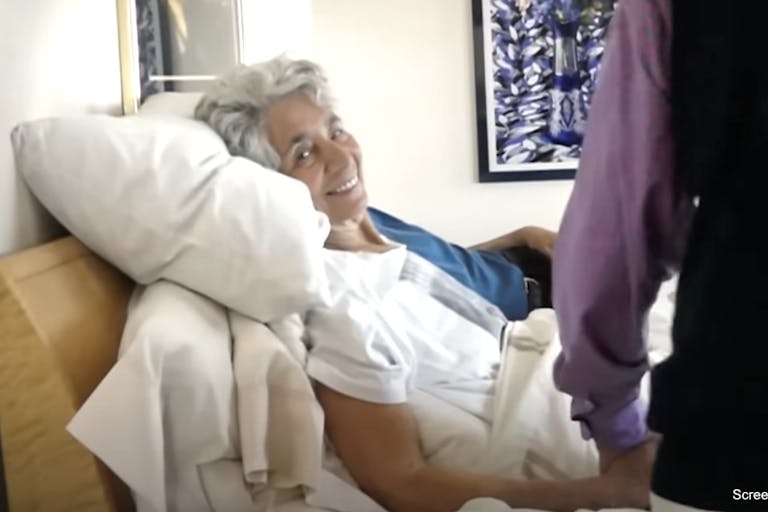
Scotland's Catholic bishops speak out against 'buffer zone' law
Bridget Sielicki
·
Woman who lost both parents to assisted suicide now wants it legal everywhere
Serene Meshel-Dillman lost both her parents to assisted suicide — and now she’s campaigning for others to do the same.
In an interview with PEOPLE, Meshel-Dillman spoke about her new documentary film, “Take Me Out Feet First,” which chronicled her parents’ deaths. Her mother, Miriam, was the first to die, after being diagnosed with stage four spindle cell sarcoma. She was told she had only months to live.
“She called me from the car on the way back from the doctor and she said, ‘I feel like I’m living in an alternative universe because I just got a three-month death diagnosis,” Meshel-Dillman said, explaining that Miriam had seen her daughter-in-law battle breast cancer for years before ultimately dying. “She just didn’t want to go through that and she didn’t want us to go through that. It was a no brainer. She said, ‘This is what I’m doing.’ She didn’t even ask about it, she just said, ‘I’m doing it.’”
Meshel-Dillman didn’t disagree, telling PEOPLE it was the right thing to do. “I just sort of felt like I had to hold her hand and just be there. It just felt right,” she said. “I think that brought us closer in the end. It really helped us come to terms, express our love for each other, express our kind of regret of not having done it sooner. And it put me and her in a very good place. We both told each other we loved each other, and we kissed and hugged. It was very emotional and certainly would not have happened then had she not been about to die. So it kind of forced the issue, but in a good way.”
Miriam’s death is centered in the trailer for the documentary, in which you can see her watching a final dance performance, being helped into her bed, and people around her preparing the fatal cocktail of drugs.

Meshel-Dillman’s father, Robert, was evidently less supportive, saying he didn’t support assisted suicide, though he ultimately was there for Miriam’s death. He was heartbroken over the loss of his wife.
“My dad was so lost. He would isolate himself, never go out, and he basically shattered any close friendships he had. Something in him died as well, and we couldn’t find it again,” Meshel-Dillman says. “He felt unmoored, he felt at sea. He just didn’t know what to do. He had no control and he was bereft. I think he just didn’t have anyone to talk to about it. And I think if they had provided a social worker or somebody to talk to him about the decision and how to handle it or how to help or how to navigate those waters, he would’ve been better off.”
Five years later, Robert was diagnosed with cancer as well. Though his cancer was treatable, he chose assisted suicide as well.
“I don’t even think it was the diagnosis,” Meshel-Dillman said. “I think the diagnosis was an excuse for him. ‘Oh, this is what I can use to now get the hell out of here.’ He just stopped living and I think he did it himself. He could have helped himself and lived longer, I believe. I really feel like mentally, [my mom’s death] is what killed him. I think the brain probably has just as much to do with the body in terms of this kind of death.”
Meshel-Dillman supported her father’s decision to undergo assisted suicide also, despite the clear insinuation of severe depression. She filmed both of her parents’ deaths for the six-part series, which is being made in conjunction with Compassion & Choices, an assisted suicide advocacy organization. Her goal is for more states to legalize assisted suicide.
Live Action News is pro-life news and commentary from a pro-life perspective.
Contact editor@liveaction.org for questions, corrections, or if you are seeking permission to reprint any Live Action News content.
Guest Articles: To submit a guest article to Live Action News, email editor@liveaction.org with an attached Word document of 800-1000 words. Please also attach any photos relevant to your submission if applicable. If your submission is accepted for publication, you will be notified within three weeks. Guest articles are not compensated (see our Open License Agreement). Thank you for your interest in Live Action News!

Bridget Sielicki
·
Analysis
Cassy Cooke
·
Politics
Cassy Cooke
·
Analysis
Cassy Cooke
·
Analysis
Nancy Flanders
·
Newsbreak
Angeline Tan
·
International
Cassy Cooke
·
Analysis
Cassy Cooke
·
Politics
Cassy Cooke
·
Analysis
Cassy Cooke
·
Activism
Cassy Cooke
·